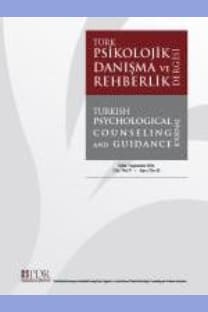Türkiye ve Gürcistan’da Liseden Mezun Olan Öğrencilerin Sosyal ve Akademik Yeterliliklerinin Karşılaştırılması
Bu çalışmada, Türkiye ve Gürcistan'daki ortaokul mezunu öğrencilerin akademik ve sosyal yeterliliklerinin karşılaştırılması amaçlanmıştır. Bu araştırmada karma yöntemlerden biri olan “Açıklayıcı Desen” kullanılmıştır. Bu tasarımda öncelikle nicel veriler toplanmış ve analiz edilmiş, ardından nicel araştırma sürecinde elde edilen verileri desteklemek için nitel veriler toplanmış ve analiz edilmiştir. Araştırmada kişisel bilgi anketi ve “Ergenlerde Sosyal ve Akademik Yeterlilik Algılama Ölçeği” kullanılmıştır. Bağımsız örneklem t testi ve çok değişkenli varyans analizi yapılmıştır. Ayrıca kullanılan ölçme araçlarının yapı geçerliliği doğrulayıcı faktör analizi ve cronbach alfa güvenirlik katsayısının güvenilirliği ile incelenmiştir. Ek olarak nitel araştırma boyutunda yapılan görüşmeler içerik analizi ile çözülmüştür. Sonuçlar, bu iki ülke arasında kültürel ve akademik yeterlilikler açısından önemli farklılıklar olduğunu göstermiştir.
Comparing Social and Academic Competence of High School Graduated Students in Turkey and Georgia
Present study aimed to compare the academic and social competencies of secondary school graduate students in Turkey and Georgia. In this research, one of the mixed methods "Explatory Design" was used. In this design, initially, quantitative data was collected and analyzed, then the qualitative data was collected and analyzed to support the data obtained during the quantitative research process. The data collected in the study by personal information questionnaire and “Social and Academic Proficiency Perception Scale in Adolescents”. Independent samples t-test and multivariate variance analysis were done. In addition, the construct validity of the measurement tools that used was examined by the confirmatory factor analysis and the reliability of the cronbach alpha reliability coefficient. Moreover, interviews which were conducted in qualitative research dimension were decoded by content analysis. Briefly, results showed that there are significant differences between these two countries through the cultural and academic competencies.
___
- Özer, A., Gençtanırım Kurt, D., Kızıldağ, S., Demirtaş Zorbaz, S., Arıcı Şahin, F., Acar, T., & Ergene, T. (2016). Ergenler için yeterlik algısı ölçeğinin (YAÖ) geliştirilmesi. Egitimde ve Psikolojide Ölçme ve Degerlendirme dergisi, 7(1), 237.
- Bernard, M. E. (2006). It's time we teach social-emotional competence as well as we teach academic competence. Reading & Writing Quarterly, 22(2), 103-119.
- Creswell, J. W., & Tashakkori, A. (2007). Differing perspectives on mixed methods research.
- Elias, M. J., & Haynes, N. M. (2008). Social competence, social support, and academic achievement in minority, low-income, urban elementary school children. School Psychology Quarterly, 23(4), 474.
- Forget-Dubois, N., Lemelin, J. P., Boivin, M., Dionne, G., Séguin, J. R., Vitaro, F., & Tremblay, R. E. (2007). Predicting early school achievement with the EDI: A longitudinal population-based study. Early Education and Development, 18(3), 405-426.
- Haager, D., Watson, C., & Willows, D. M. (1995). Parent, teacher, peer, and self-reports of the social competence of students with learning disabilities. Journal of Learning Disabilities, 28(4), 205-215.
- Ladd, G. W., Herald, S. L., & Kochel, K. P. (2006). School readiness: Are there social prerequisites?. Early education and development, 17(1), 115-150.
- Magelinskaitė, Š. (2011). Pirmaklasių mokinių socialinio subrendimo ir adaptacijos mokykloje rodiklių sąsajos. Pedagogika, (103), 45-51.
- National Education Statistics Database. (2019). View List of International surveys. Retrieved from https://nces.ed.gov/ on the 12.06.2019.
- National Statistics Office of Georgia. (2018). View List of Data Systems. Retrieved from https://www.geostat.ge/en on the 12.10.2018.
- Programme for International Student Assessment. (2015).
- Sassu, R. (2007). The evaluation of school readiness for 5-8 years old children-cognitive, socical-emotional, and motor coordination and physical health perspectives. Cognitie, Creier, Comportament/Cognition, Brain, Behavior, 11(1).
- Society T. L. (2017). Turkish dictionary. Turkish Language Society. Retrieved from https://sozluk.gov.tr/. on the 11.07.2017.
- Webster-Stratton, C. & Reid, M.J. 2004. Strenghtening social and emotional competence in young children – the foundation for early school readiness and success. Infants and Young Children, 17, 96-113.
- Vaughn, S., & Hogan, A. (1990). Social competence and learning disabilities: A prospective study. Learning disabilities: Theoretical and Research Issues, 175-191.
- Vaughn, S., & Hogan, A. (1994). The social competence of students with learning disabilities over time: A within- individual examination. Journal of Learning Disabilities, 27(5), 292-303.
- Turkish Statistical Institute (TUIK). (2018). Population statistics and projections. Retrieved from https://www.tuik.gov.tr/ on the 03.07.2018.
- ISSN: 1302-1370
- Başlangıç: 1990
- Yayıncı: -
